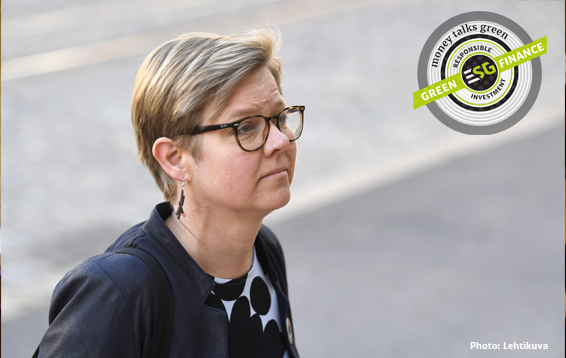
The economy’s coronavirus recovery measures must include consideration of climate criteria. A single euro or billion can only be used once, which is why all governmental recovery measures must be examined also in light of their impact on the environment and climate.
The plans for economic recovery after the coronavirus crisis must include consideration of environmental and climate impact, says Finnish Minister of the Environment and Climate Change Krista Mikkonen (the Greens). The minister believes the financial sector has a key role in steering capital from the fossil economy into environmentally friendly technologies. According to Mikkonen, the EU-level definition of sustainable finance has taken major steps forward in the last few years. She endorses increasing transparency of the climate and environmental impact of investments and investment funds.
Finance Finland (FFI) interviewed key policy makers with a set of four questions on sustainable finance and economic recovery.
As we’re working to revitalise the society after the coronavirus crisis, how is the prevention of climate change taken into account?
“The coronavirus has changed many things in our society, but it has not erased climate change or the loss of biodiversity. A single euro or billion can only be used once, which is why all state recovery measures must be examined also in light of their impact on the environment and climate. Studies have found that climate measures are also very beneficial to economic activity.”
“The Finnish government’s fourth supplementary budget proposal for 2020 introduced measures to support the post-COVID recovery and revitalisation of the economy. These included many environmentally sustainable projects, such as multi-billion investments into rails, public transportation, road infrastructure for pedestrians and cyclists, wind power, camping areas, forest conservation, as well as measures supporting local government and households make energy-efficient changes.”
What would be the best way for the government and the financial sector to cooperatively curb climate change?
“Climate change can not be solved by government action alone. We need the support of all the sectors. The financial sector has a key role in steering capital from the fossil economy into environmentally friendly technologies in line with the Paris Accord. More transparency is needed when it comes to the climate and environmental impact of investments and investment funds.”
“The EU-level definition of sustainable finance has taken some major steps forward in the last few years. Because the majority of climate measures are made through private sector investments, it is important that we find ways for the public sector to promote these investments as effectively as possible.”
In your opinion, how should sustainable finance be promoted?
“Companies’ ESG reporting is a very important tool to making sustainable finance more mainstream. The criteria of sustainable finance can also help target the public sector’s subsidies and acquisitions. Public authority should also consider making responsible investment a requirement for pension funds and other statutory activities.”
What is your take on the idea that climate change mitigation should be one of the criteria for business subsidies related to the coronavirus crisis?
“I think this is an important idea. In the early stages of the crisis, subsidies were granted at a fast rate to prevent a wave of bankruptcies, but now that we are moving towards economic recovery, climate criteria should be emphasised more.”
“Targeting economic revitalisation at investments that support the transition towards carbon-neutral circular economy would also steer us toward sustainable growth in the future. In any case, we should make sure we don’t slow down the ongoing structural change towards environmentally sustainable operations.”
Finance Finland (FFI) interviewed key policy makers with a set of four questions on sustainable finance and economic recovery. Other interviews published in this series so far:
Matti Vanhanen, Minister of Finance
Still have questions?
|Contact FFI experts



